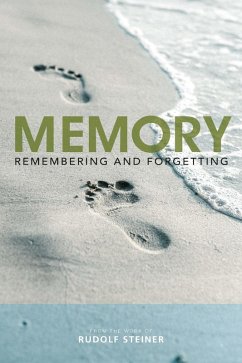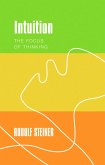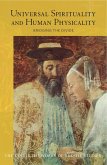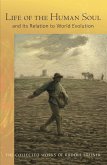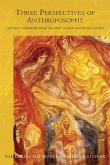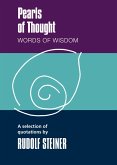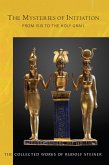What is the meaning of memory in the information age? When all knowledge is seemingly digitised and available for reference at any time, do we actually need human memory? One consequence of the proliferation of digitization is the deterioration of our capacity to remember - a symptom that is apparent in a steady increase in dementia within contemporary society. Rudolf Steiner indicates that memory is the determining factor in awareness of oneself. Even a partial loss of memory leads to loss of self-consciousness and the sense of our 'I'. Thus, memory is crucial for the development of I-consciousness - not only for the individual, but for humanity as a whole.
Rudolf Steiner's research on memory, recollection and forgetting has many implications for the way we learn, for inner development and spiritual growth. This unique selection of passages from his works offers insights into how consciousness can remain autonomous and creative in a digital environment. It also provides ideas for improving education and emphasizes the importance of life-long learning.
Chapters include: 'The Development of Memory Throughout Human History'; 'The Formation of Memory, Remembering and Forgetting in the Human Individual'; 'Remembering and Forgetting in Connection with Education'; 'How Remembering and Forgetting are Transformed by the Schooling Path - Imagination and Inspiration'; 'Remembering Backwards (Rückschau) and Memory Exercises'; 'Subconscious Memories of the Pre-birth Period and of Life Between Death and a New Birth'; 'Memory and Remembering after Death'; 'The Development of Memory in the Future'.
Rudolf Steiner's research on memory, recollection and forgetting has many implications for the way we learn, for inner development and spiritual growth. This unique selection of passages from his works offers insights into how consciousness can remain autonomous and creative in a digital environment. It also provides ideas for improving education and emphasizes the importance of life-long learning.
Chapters include: 'The Development of Memory Throughout Human History'; 'The Formation of Memory, Remembering and Forgetting in the Human Individual'; 'Remembering and Forgetting in Connection with Education'; 'How Remembering and Forgetting are Transformed by the Schooling Path - Imagination and Inspiration'; 'Remembering Backwards (Rückschau) and Memory Exercises'; 'Subconscious Memories of the Pre-birth Period and of Life Between Death and a New Birth'; 'Memory and Remembering after Death'; 'The Development of Memory in the Future'.
Dieser Download kann aus rechtlichen Gründen nur mit Rechnungsadresse in A, B, BG, CY, CZ, D, DK, EW, E, FIN, F, GR, H, IRL, I, LT, L, LR, M, NL, PL, P, R, S, SLO, SK ausgeliefert werden.

